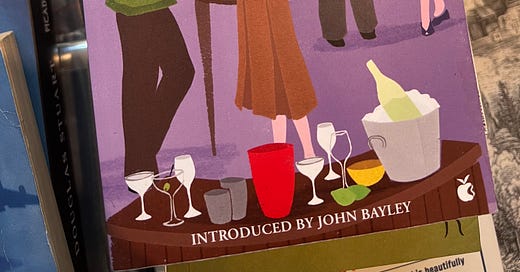In Barbara Pym’s A Glass of Blessings, the narrator Wilmet Forsyth – a woman of leisure in Holland Park, married to dull civil servant Rodney, in love with a chap called Piers – is entangled in the domestic dramas of three Anglo-Catholic priests.
I enjoyed this comedy of manners hugely, partly because I was so fascinated by its gay characters. It’s never stated they’re gay, but we know because:
Piers is elusive, and Wilmet spies him creeping into a pub in the middle of the day;
Piers’s ‘friend’, a lower-middle-class chap called Keith, is a model for knitting pattern magazines, and works at a dimly lit coffee bar near Marble Arch called the Cenerentola;
Keith tidies up after Piers in the flat they share in the Goldhawk Road;
Keith admires that Wilmet’s curtains are lined.
These signifiers (curtain-esteem! – and there are even camper ones, including a very queer-in-all-senses subplot involving a Fabergé egg) are presented amusingly and inoffensively. In the 1950s, Angus Wilson depicted queerness (his novels use the word ‘queer’) as entirely natural in Hemlock and After, Anglo-Saxon Attitudes and The Middle Age of Mrs Eliot, and some of that naturalness is here: as well-read as she is, Wilmet is slightly unschooled in the matter, and Pym has fun with it. Wilmet can be sublimely snobbish: she finds the Goldhawk Road exotic (this is very London - it’s a stone’s throw from Holland Park); she can’t believe Keith doesn’t speak French; and she wonders if he
might be a colonial, perhaps a New Zealander; I remembered clever moody passionate girls, like Katherine Mansfield, striving to break away from the narrowness of their environment, almost nineteenth-century Russian in their yearnings, hating the traditional English Christmas in the middle of summer and the sentimental attitude towards the Mother Country. They would come to London and live wretchedly, perhaps starving in an attic, exulting in their freedom, and yet keeping underneath everything their innate primness and respectability. Was Keith like this, or did he just come from Fulham or Brixton or some dreary English provincial town? (p. 219)
Colonial! Brixton! Provinces! It should be insufferable, except it’s a razor-sharp account of pointless Antipodean Anglophilia (‘No, I don’t want England’, wrote Mansfield in her journal, ‘England is of no use to me’), as well as superb character writing that simultaneously upholds and destabilises the imperial/metro/hetero centre: Wilmet can’t classify Keith, and it troubles her.
(He comes from Leicester.)




